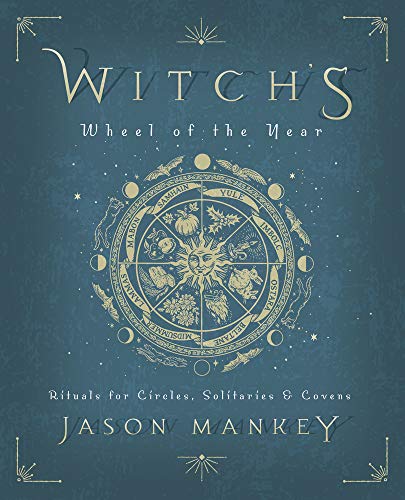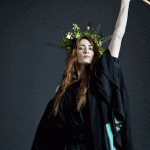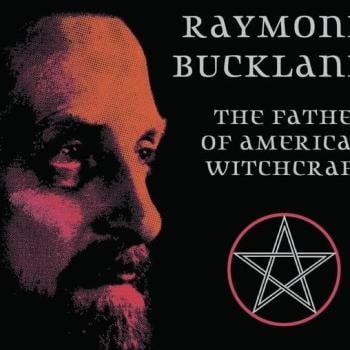A lot of websites right now are reviewing the last ten years and trying to put that period of time into some perspective. John Beckett suggested I do the same here on Patheos Pagan so I thought I would give it a go. The difficulty in a writing assignment such as this reflects just how much the Pagan Community has changed over the last ten years. In 2010 I thought I had a good grasp on what Pagan and Witchcraft are, in 2019 I no longer believe that, and defining either one has become much more challenging.
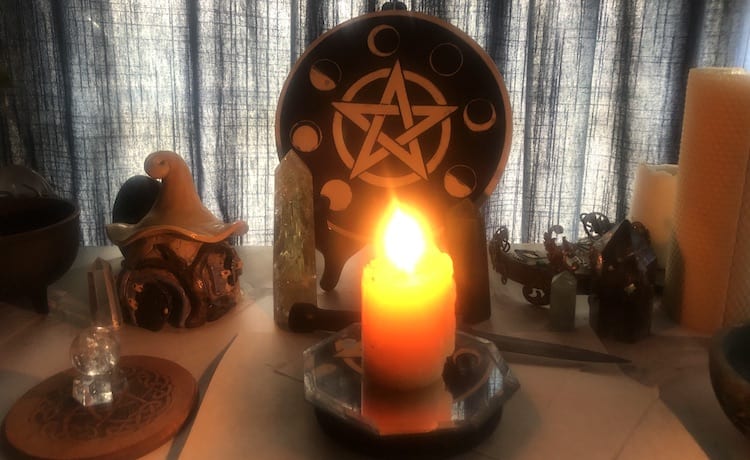
I started writing at Patheos Pagan in 2011, and launched this blog in 2012. I became channel manager of Patheos Pagan in 2015, and over the last five years have watched the ups and downs of this space as part of my job. My first Llewellyn book was released in 2016, and as of today I have released five (that’s a lot of books in a short period of time). Those books have allowed me to travel around the United States and speak at a lot of different places, and meet a huge number of folks. I’m not sure I’ve had a “front row seat” to this decade in Paganism, but I’ve seen a lot of it, and more than most.
There will be people who read this article and object to just how broad it is. I can see people making arguments that it should instead focus on specific stories and moments over the last 10 years, but I disagree. The amount of Pagans who are wired into that eco-system (read the Wild Hunt everyday, avidly consume dozens of blogs, etc.,) is a small number of us. I think it’s the big picture items that will have the most lasting impact on Paganism and Witchcraft.
The Breaking of the Umbrella
For most of the 1990’s and into the early 2000’s most people I knew in the Pagan world identified as Pagans. They might be Witches or Druids, but eventually they always seemed to come back around to Pagan. “Neo-Pagan” wasn’t a dirty word fifteen years ago either. It was a word used by smart people to describe a rather new religious and spiritual community. (Just writing the word “Neo-Pagan” makes me feel as if someone is sneering at me.)
Today about half the people I think of as “Pagans” (and this often includes myself) actively bristle at the word. On this website we’ve written a lot about the Pagan Umbrella over the last ten years, but I’m not sure that analogy really works anymore. I don’t really think we all are standing under the same umbrella anymore (or are even on the same street corner), and not because we’ve pushed people out* but because people have chosen to leave.
There are a lot of really smart people I think of as Pagans who DO NOT want to be called Pagans. I remember when different people from different Pagan traditions actively hung out and talked shop. That seems to be happening less and less. Some of that is because social media has made it easier to divide into smaller subgroups, but there’s some real animosity out there right now, and often among groups who have more in common than they do in disagreement.
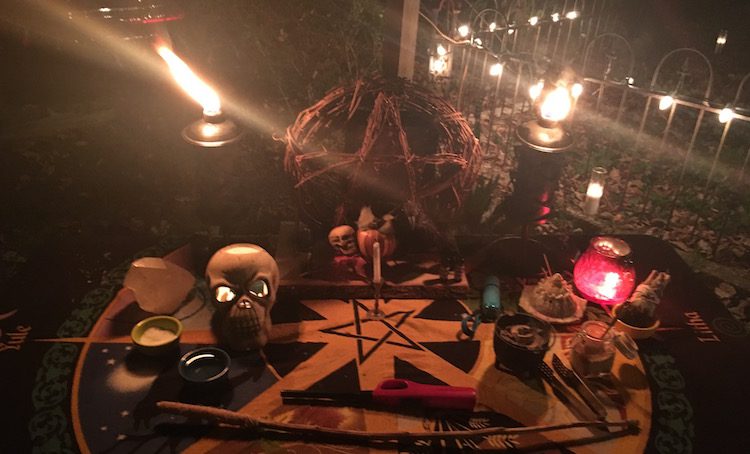
Rise of the Witch
Part of the umbrella’s break-up has been the renewed strength of Witchcraft, or perhaps more specifically Witchcrafts. I’m not sure Paganism is growing much right now, but Witchcraft most certainly is. For the last 100 years there’s been an “occult bubble” every twenty years or so. The most pronounced bubbles were in the late 60’s/early 70’s, the latter half of the 1990’s, and right now. Often these bubbles are fueled by popular culture, Witches on TV or at the movies, and that’s certainly the case currently.
But today’s bubble feels very different. Even in 1998 when Witchcraft was “hot” it still required a trip into at least the local Barnes and Noble. Today, that’s no longer the case. You can pick up Witch books at retail stores such as Urban Outfitters, or simply search Instagram for spell ideas. Witchcraft has become a part of the zeitgeist, in a way it never has before.
Until recently Modern Witchcraft was generally tied into some sort of spiritual system. Most of the self-identified Witches I knew twenty years ago talked at least a little about the sabbats or maybe “the Goddess.” Today that’s no longer really the case and “Witchcraft” seems to be associated more simply with just “magic.” There are some who will argue that it’s always been that way, but I disagree. Books on Witchcraft emphasized a variety of different things, a lot of today’s Witchcraft simply focuses on magickal practice.
The current Witch-bubble is creating Witches far outside of “Pagan spaces.” Many of the Witches who are coming to the Craft through Lana Del Rey and social media are inhabiting different worlds than those of you reading this article. They aren’t reading our blogs, reading our traditional publishers, or shopping at the local Witch store. It’s almost as if there are two separate Witch eco-systems, there are those who go to events that are familiar to us, and those inhabiting an entirely different space.

I interviewed Amanda Yates Garcia recently and read her book, much of her story was familiar to me because we are of a similar age, however . . . With the exception of Michael Hughes I didn’t know any of the people who blurbed her book (rare for me in the Witch-world), and I’m pretty sure Yates Garcia and I have never been to the same event. That’s not a knock on her (or I hope, me), just an example of the two parallel Witchcraft worlds that exist today. She’s operating in a different sphere than I am on Patheos and at Llewellyn, and that’s OK, but it seems more common today than it did 20 years ago.
The era when Witchcraft and Wicca were nearly always synonyms is long over too, and there are several different, competing versions of Witchcraft out in the world. Some people reading this will say “there’s always been lots of different types of Witchcraft,” and while that’s true, today there’s a nearly infinite amount of materials documenting those Witchcrafts. “Traditional Witchcraft” books were few and far between before 2014, that there are dozens being printed every month now is a sea-change.
We Are More Political Than Ever Before
Witchcraft has always been political, no matter how you define Witchcraft or when you think it started. Simply calling yourself a Witch and saying that you practice magick is a rather revolutionary way to act and self-identify. Many occult organizations have been progressive when compared to the society’s they emerged in. The Golden Dawn was co-ed, that was a pretty big deal in 1890.
Since the late 1960’s Paganism and Witchcraft have had a pretty strong activist streak, but it feels more out in front today than it ever has before. Today we are writing books containing spells for societal change, a worldwide movement to bind Trump has captivated the media (and struck fear in the heart’s of the President’s supporters). That I would argue is new, just how in your face it all is. I for one love it, you might feel differently.
But Pagandom’s embrace of the political is about more than ousting a lousy President, it’s about creating a more equitable and just society. As a whole, we are a community that embraces everyone and anyone capable of loving and accepting others. We have a long way to go when it comes to issues such as racism and complete LGBTQ+ acceptance, but I would argue that most of us even being aware of these issues has us further along than other spiritual groups.

I am a “glass half full” person, not a glass half empty type, and again, I realize that things are not perfect. But we are making progress, and many of the people who have tried to hold our greater community back over the decades are being pushed out of the umbrella or dying of old age.
Paganism has always played lip-service to “loving the Earth,” but with climate change already here and impacting our lives we can’t play lip service anymore. I don’t agree with every attempt that has been made to raise awareness of the issue over the last ten years in our community, but the fact that the issue is being raised and we are cognizant of it is important. (And it’s probably already impacted your rituals whether you know it or not!) Now the question becomes what are we going to do about it?
The Return of Nazis and the Rise of the Alt-Right
There have always been racists and Nazi-adjacent individuals in the world, but previously they’ve never been this brazen. While I don’t think individuals spouting Nazi ideology are a part of the Pagan Community you and I belong to, they are often adjacent to it, and sometimes make inroads into it. Some of those inroads are because they use language that doesn’t sound racist at first listen, yet still is. “Folkish” is a synonym for racist, there are no racial requirements for worshipping or honoring specific gods.
This has become an issue in recent years because of how acceptable racism currently is in parts of our society. What was previously kept in the closet, is now on full display for all to see. What this means going forward is that we will have to be even more vigilant than usual to make sure racist ideologies do not creep into spaces such as this one. I never thought society would have taken several giant steps backwards as we approach 2020, but that’s exactly what has happened.

Changing Pagan Media Landscape
The first book written by a self-identified Witch was released in 1954, in the nearly 70 years since, books have been the main source of entry into Pagan and Witch traditions. Those books might not have introduced people to Paganism, but to practice Paganism they were essential. Today, that’s no longer the case. Beginning in the late 1990’s blogs began to pick up some of that burden. But today social media serves as its own entryway into Paganism, and to learn about Paganism or Witchcraft simply requires a visit to YouTube.
The Pagan media landscape has completely changed over the last 20 years, and that process has gained momentum especially over the last 10. There are “famous Pagans’ today who exist only on Instagram and Youtube. (Many of the folks on YouTube are quite knowledgeable and entertaining by the way!) Want 100,000 followers on social media? Post pretty pictures of your spellwork and you’ll get there. Do I find this change problematic? Despite what it sounds like, I really don’t. People will find what they are meant to find, and get out of it what they put into it. The more entryways into the magickal world the better.
The current Witch boom has been picked up by people outside of our eco-system too. Mainstream publishers are publishing all sorts of Witch books today, and sometimes even doing a good job of it. (Some of them, not surprisingly, feel like the cash-in books they are.) Today aspiring writers can aim for Hachette instead of Llewellyn and that’s a good thing. Anything that gets Witch-books into people’s hands is OK with me.
In addition to social media, books, and videos, Pagan and Witch podcasts are immensely popular. No matter your flavor of magickal practice you can find something entertaining to listen to out there. And in many cases the podcasts being produced in our community are as good (if not better) than anything else. The hosts are engaged, prepared, and damn good at what they do. All of this media can feel a little overwhelming sometimes, but it also serves as a great source of connection.
And oh yeah, streaming services have completely changed how we might consume “Pagan music” (that is music written by Pagans, performed by Pagans, and mostly for Pagans). I listen to more Pagan artists now than ever, because I can actually find their recordings outside of festivals and Witch-stores. The downside to this is that streaming services aren’t particularly lucrative for artists. Things like Patreon have tried to fill that void (and for artists and writers too, nothing online is worth very much), though I’m not sure if that has made up any of the difference.
Having greater access to Pagan music through Spotify or Apple Music is great. That those artists don’t make enough to buy dinner after we listen is a very real issue.
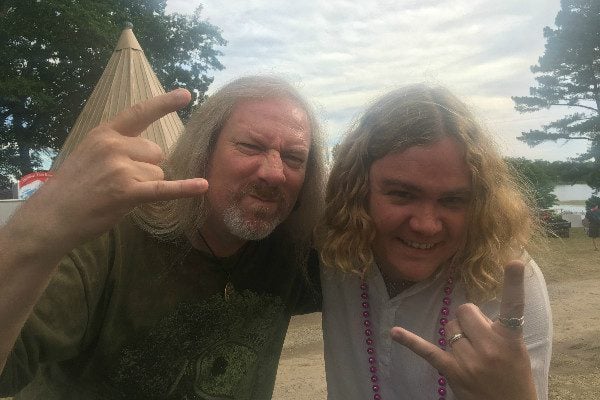
Quick Hits, Things Worth Commenting On Briefly
Are Pagan Festivals dying? People seem to think they are. I don’t think that’s the case, but they are changing. They are becoming more regional, and the future lies in indoor events not ones with tents and rain.
Our Numbers Are Up Despite people saying that Paganism is dying over the last five years, there are two million (or more) Witches and Pagans currently living in the United States. This is a big number. Someday soon someone will recognize us as the large voting block we are.
The Future is In Small Groups and Solitary Practice While there are more of us, I’m not sure the future of the broader movement lies in large national groups. There are more solitaries than ever before, and people practicing in small private groups. This makes determining our numbers, and utilizing them, difficult, but it will keep us from ever becoming a cult lead by one or two people.
No Place for Predators Our spaces are not as safe and welcoming as they should be, but I think we are making progress. It’s hard to be an abuser and get away with it in the era of social media and #MeToo. I alluded to this earlier in the piece, but it’s worth mentioning specifically here.
The Second Generation of Pagandom is Dying Many of the people who helped create the Pagan world we live in today have died over the past ten years. We are at a point where some of our most influential teachers and writers of the last twenty or thirty years have passed on. This creates an opportunity for new voices, but I really liked listening to a lot of those old voices. We are a young movement, and many of the people who have impacted it the most are still living. Take some time to appreciate that, and if you an meet those folks, do it. It’ll be worth the investment.
How a religious or spiritual movement reacts to changes in leadership says a lot about how it will progress in the future. We will never have another Margot Adler, but I’m hopeful that there are people out there capable of having a similar positive influence long-term.
Change Has Always Been a Part of Our Community Over the last ten years there have been three people at the editorial helm of the Wild Hunt. Witchvox will be closing its doors at the end of this year. Those are (or have been) big changes, but change is what creates new opportunities.
Going forward there will be even more changes. Will the “Pagan Community” coalesce again? Will many of the new Witches adjacent to our community become a part of it? How viable will Pagan music and art be going forward? The answers to these questions lies in the soon to be roaring 2020’s and beyond. And gods willing, we’ll reflect them on there in ten years time.
_____
*Are you a racist? A homophobe? A transphobe? An intolerant asshole? Well, we tend to shove all of those folks out from under the umbrella. The shoving process is not perfect, but you aren’t going to see a Nazi write at Patheos Pagan or for Llewellyn.
My latest book THE WITCH’S WHEEL OF THE YEAR: RITUALS FOR CIRCLES, SOLITARIES, & COVENS is now available everywhere!
